Maidan cases almost ten years later: what is the situation today?
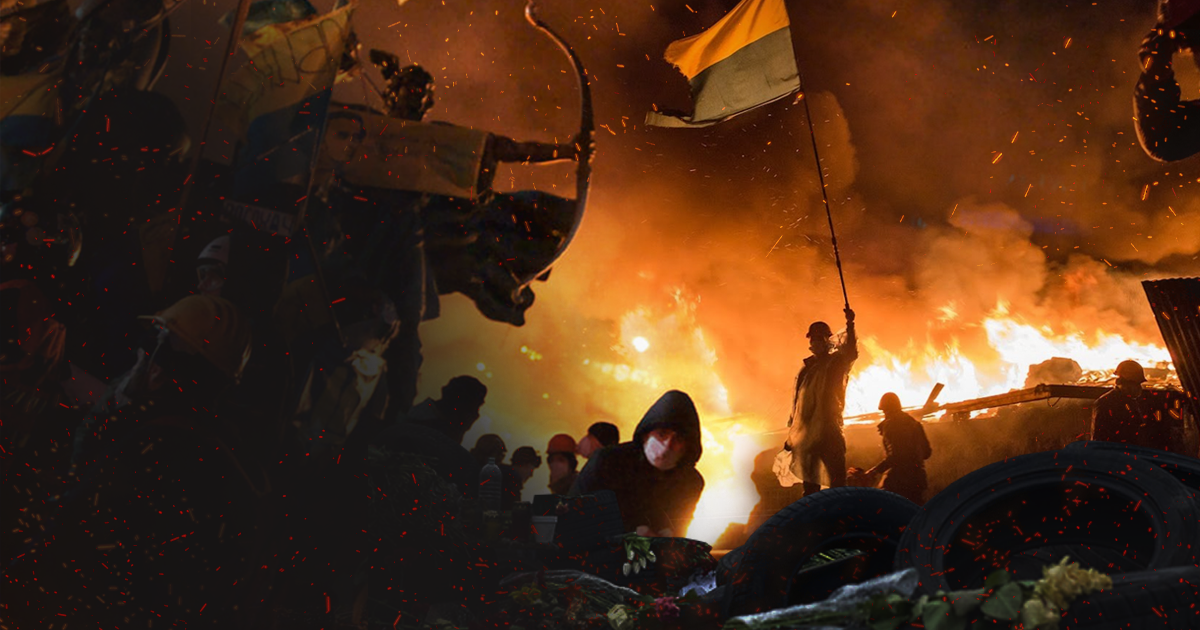
In 2013-2014, people died at the hands of law enforcement officers, but they stood on the Maidan for reforms in the country. Then-President Viktor Yanukovych and the political leadership fled, Russia started a war and occupied Ukrainian territory — the events of the Revolution of Dignity divided Ukraine's recent history into "before" and "after".
November 21 marks the tenth anniversary of the day Ukrainians gathered in their city squares. Throughout these years, cases of dispersal, beatings and killings of demonstrators have been investigated and considered. These cases are commonly referred to as the 'Maidan cases'.
In nearly 60 criminal cases, the statute of limitations expired in November and February, and it was not until October 18, 2023, that the court announced the verdict in the case of the shootings on February 20, when police killed 48 people.
Read the article to find out why none of those responsible for the shootings have been imprisoned, why this verdict is still essential, and how other Maidan cases are progressing.
Shootings that spared any jail sentence
On October 18, the Sviatoshyn District Court of Kyiv announced the verdict in the case of the shootings on Instytutska Street on February 20, 2014, when police officers killed 48 people. This case is called the major "Maidan case".
The trial lasted from 2016. Sessions were held every week, and all were broadcast — the Maidan cases attracted public and media attention, so the trial was broadcast online for the first time in Ukraine.
The court questioned 245 people and examined over three terabytes of video and photographic footage to reconstruct the detailed course of events and establish the circumstances of each victim's death and injury. In this case, the fourth president of Ukraine, Viktor Yanukovych, was interrogated — in 2016, he was connected via video link from Rostov-on-Don.
The verdict was 1714 pages long, but the public did not get the expected results - no one was imprisoned.
The prosecutor's office charged the deputy commander of Kyiv's Berkut regiment, Oleh Yanishevskyi, and four Berkut officers from the Kyiv Special Company with the murder of 48 people and the wounding of 80 on Instytutska Street: Pavlo Abroskin, Serhii Zinchenko, Serhii Tamtura and Oleksandr Marynchenko.
It was these people (127 in total) that Ukraine handed over to the militants of the illegal armed groups of the " L/DPR" as part of the exchange in 2019. In return, 76 people were returned: 12 military and 64 civilians. Among them is journalist Stanislav Aseiev, who wrote reports during the occupation and was held in the Donetsk torture chamber 'Izoliatsia'.
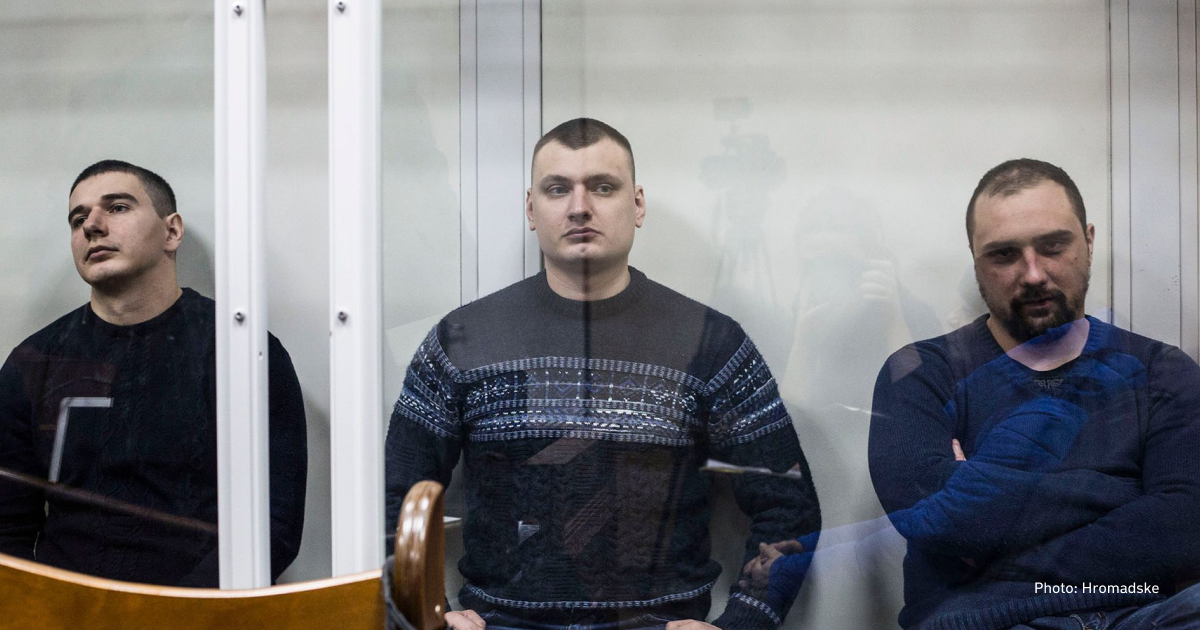
Due to the exchange of Berkut officers, the court could not continue the consideration of the case on the merits for a year.
I respect all those who lost their loved ones on Maidan. We will not bring back the dead, but we could bring back the living. And this is a priority. If I had another 100 Berkut officers and they offered me one scout, I would give these 100 Berkut officers,
Volodymyr Zelenskyy commented on the exchange and assured that "this would not affect the Maidan cases".
Less than two months later, Oleksandr Marynchenko and Serhii Tamtura returned to Kyiv. The others did not.
"The truth is the reason for the return. The trial has been Maidan's main source of truth for five years and must continue. We will continue to attend the hearings. We have nothing to hide — we have committed no crimes. We want to restore the honourable name of the Berkut special forces," they wrote in an appeal to the president published by the defendants' lawyer, Oleksandr Horoshynskyi.
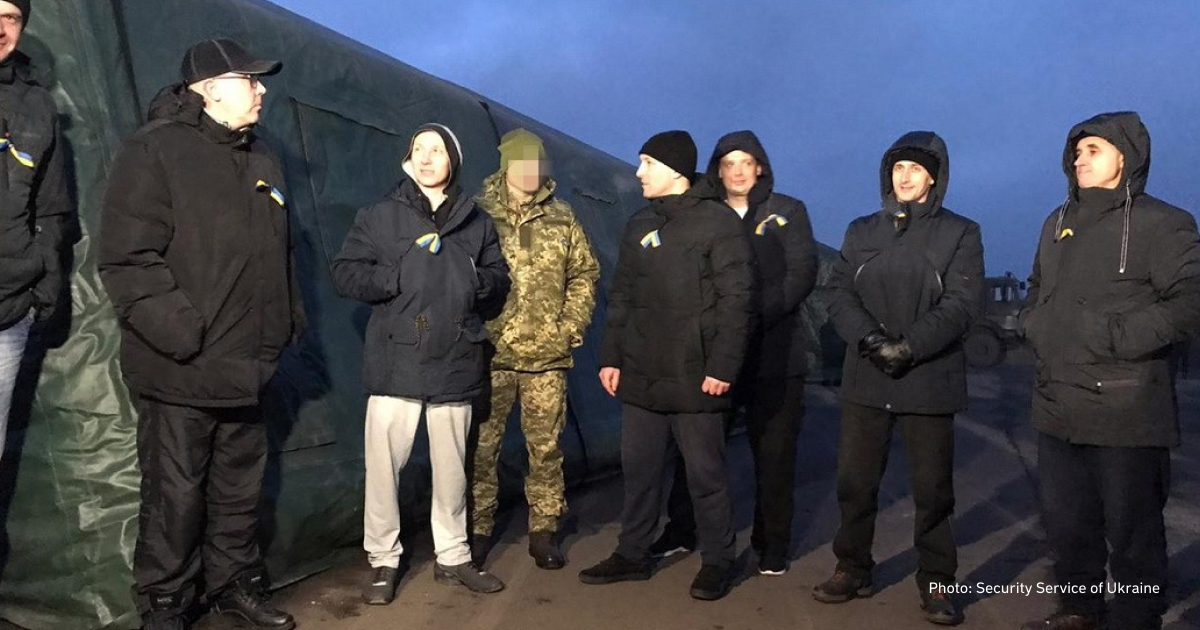
However, Vitalii Tytych, a lawyer for the Heavenly Hundred families and a member of the Legal Advisory Group, told Svidomi that the ex-Berkut officers had returned and had been assured they would not go to jail.
They did not come back — they were returned. The lawyers and the FSS officers told them they would not be prosecuted. Everything has been done, everything has been agreed, and they have to come back and take part in these meetings so that at least society will be surprised that they have been released. After all, according to the classics of the genre, they were supposed to stay there (in Russia – ed.), but they came back and said: 'We don't want to go anywhere and we will defend our honest name at the hearings',
the lawyer says.
Vitalii Tytych notes that before the exchange, the presiding judge, Serhii Diachuk, said he would no longer impose a prison sentence when deciding on the preventive measure change.
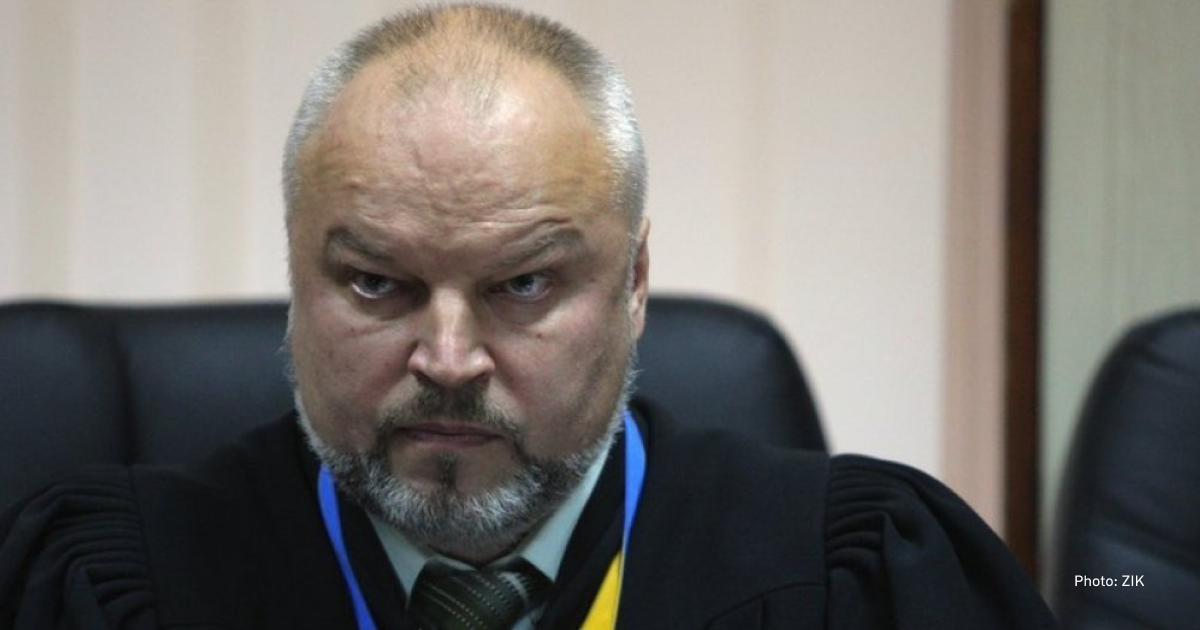
"The prosecutor has not presented convincing evidence that could convince an objective observer that Marinchenko could have committed severe illegal acts involving violence against victims," the judge said at the time.
In 2023, the judge told Slidstvo.info that it was a necessary formality before the exchange, which he did not want to agree to, but the authorities intervened.
And so it happened — they remained free. The prosecutor's office and the victims asked for life imprisonment for all the defendants. After the exchange, the court only imposed sentences on those who stayed in Russia.
- Oleh Yanishevskiy (put on the international wanted list) was sentenced to life imprisonment;
- Pavel Abroskin (put on the international wanted list) — 15 years in prison;
- Sergiy Zinchenko (put on the international wanted list) — 15 years in prison;
- Oleksandr Marynchenko (returned) — five years in prison, but the court believes that he has already served his sentence, as he was in custody from 2015 to 2019, where one day of pre-trial detention is counted as two days.
- Serhii Tamtura (returned) was acquitted of all charges.
The defendants were found guilty of abuse of power and premeditated murder. At the same time, all were acquitted of committing a terrorist act, unlawfully obstructing peaceful assemblies and unlawful possession or handling of weapons, which they had been charged with earlier.
The court also reclassified the case from "murder committed in pursuance of a criminal order" to "involuntary manslaughter".
Prosecutors and defence lawyers on both sides say they will appeal the verdict. The prosecution is seeking life imprisonment, while the defence is seeking acquittal.
"We will appeal the verdict in its entirety. Regarding qualifications and individual defendants," prosecutor Oleksii Donskyi told Watchers after the verdict was announced.
He stressed that he disagreed with the acquittal of Serhii Tamtura, whose position had been completely refuted by the prosecution's evidence. Judge Serhii Diachuk, who presided over the case, said that although there was evidence that Tamtura was on Instytutska Street, "his behaviour did not show signs of a criminal offence". According to the judge, there is no evidence that the Berkut officer threw a stun grenade or fired a shot.
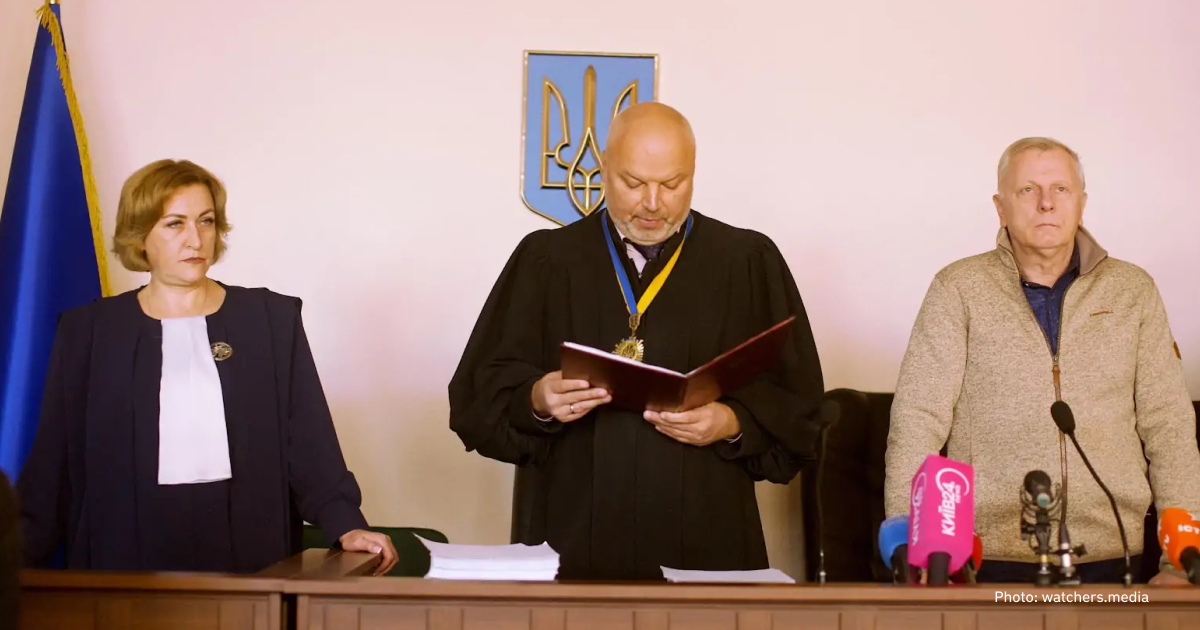
Why is this essential?
At the same time, the judge and human rights activists note the importance and resonance of this case in that it dispelled the myths surrounding the alleged perpetrators of the shootings.
"Now the story about 'Georgian snipers' and FSS officers who were sitting on Zhovtnevyi and shot at both of them is not true," Judge Dyachuk told Watchers.
This was also noted by Yevheniia Zakrevska, head of the Legal Advisory Group representing the families of the Heavenly Hundred Heroes in Maidan cases.
It is a shame to admit, but Ukrainian police officers killed 48 Ukrainian citizens. This must be stated in the verdict because society needs to know. Without awareness, neither police reform nor further normal interaction between law enforcement agencies and citizens is possible. This is necessary to understand what arbitrariness of the police, the use of law enforcement agencies as political tools and impunity lead to,
she wrote on Facebook.
What is essential is that the case recreated the events of February 20 minute by minute and recorded the Russian factor.
The court ruled that the then government refused to sign the Association Agreement with the EU because of Russian pressure and that the Russian military and political leadership used the Maidan events to occupy Ukrainian territory in 2014.
It is also stated that "the violence was mutual". On February 20, 2014, at 05:30, "unidentified persons used firearms against police officers", and starting from 08:55, "protesters spontaneously and en masse went beyond their barricades and began to pursue and attack the law enforcement forces".
The court did not recognise the February 20, 2014 events as a peaceful protest. We should not fool ourselves. We believe that this is the right to uprising. But an uprising cannot be peaceful. If we are talking about the Revolution of Dignity, it was an armed uprising of people against tyranny and arbitrariness,
said Judge Diachuk.
Other Maidan cases
In February this year, Oleksii Donskyi, head of a department at the Prosecutor General's Office, said that out of 134 criminal proceedings in these cases, almost half are within the statute of limitations.
Dmytro Dereviankin and Vadym Shepel are ex-Berkut members who dispersed the Maidan protest in Kyiv on the night of November 30, 2013. On November 2, a court found them guilty and sentenced them to three years in prison for abuse of power.
The court also found them guilty of unlawful obstruction of peaceful assemblies and forgery. However, Dereviankin and Shepel escaped punishment due to the expiration of the statute of limitations. Under these articles, they could have received another three years in prison.
In recent months, the State Bureau of Investigation has reported that it has completed investigations into those involved in the shootings of Maidan activists.
The case against six Berkut officers was sent to court on October 13. The special pre-trial investigation against 14 other police officers is in its final stages. The defendants are hiding in Russia and have become Russian citizens.
The State Bureau of Investigation officers have completed the investigation into the case against the former leadership of Ukraine for organising the dispersal and shooting of demonstrators on February 18-20, 2014. The defendants include Viktor Yanukovych, former Minister of Internal Affairs Vitalii Zakharchenko, former Head of the Security Service of Ukraine Oleksandr Yakymenko, and Minister of Defence Pavlo Lebedev.
I would not call it an intensification [of investigations]. It would be more appropriate to say that this process is now less obstructed and, to some extent, even stimulated, unlike the previous work of the Special Investigation Department, when the work was blocked (this department was dissolved as part of the Prosecutor General's Office in 2019, and the Maidan cases were transferred to the SBI – ed.),
says Vitalii Tytych, a lawyer for the Heavenly Hundred families.
He notes that most closed cases contain evidence collected in 2015–2016. Now, it is being grouped, described and presented to the court. However, the fact that cases with charges have been submitted to the court does not mean anything.
There are some positive processes going on because at least there is the will of the prosecutor leading the process. I am talking about Oleksii Donskyi. We (the Heavenly Hundred families – ed. lawyers) will help achieve positive results for Ukraine. Ukraine is currently in a deep loss after this verdict, so we will continue to work,
says Tytych.
Did the full-scale war affect the proceedings?
After the start of the full-scale invasion, investigative actions were interrupted. And SBI employees destroyed some materials when they evacuated from Kyiv.
With Russia's open attack and understanding who was the mastermind and top-level organiser of the crime, those who impeded the inquiry now have grounds to ascertain the actual events that transpired in Kyiv from 2013-2014, who orchestrated it and for what purpose. They will no longer flirt with the masterminds of these crimes, and I hope they will finally start investigating properly,
says Tytych.
In the previous year, SBI disclosed over 20 ex-police officers from the terminated Berkut special forces brigade who are now fighting for the Russian army in Ukraine or are a part of the occupation's "law enforcement agencies". However, the absconding of the culprits from the Revolution of Dignity is not the only predicament.
There are no trials in Ukraine in the sense of the Criminal Procedure Code. Ukrainian courts systematically destroy the cases they investigate. This has been said repeatedly, and the victims themselves have held rallies and blocked the courts. There are people accused of committing a terrorist act that resulted in the deaths of a large number of people, of premeditated murder. Still, these people do not appear at hearings, no preventive measures have been imposed, and they allegedly serve in the army. This is the contradiction we live in,
concludes the lawyer for the Heavenly Hundred families.


